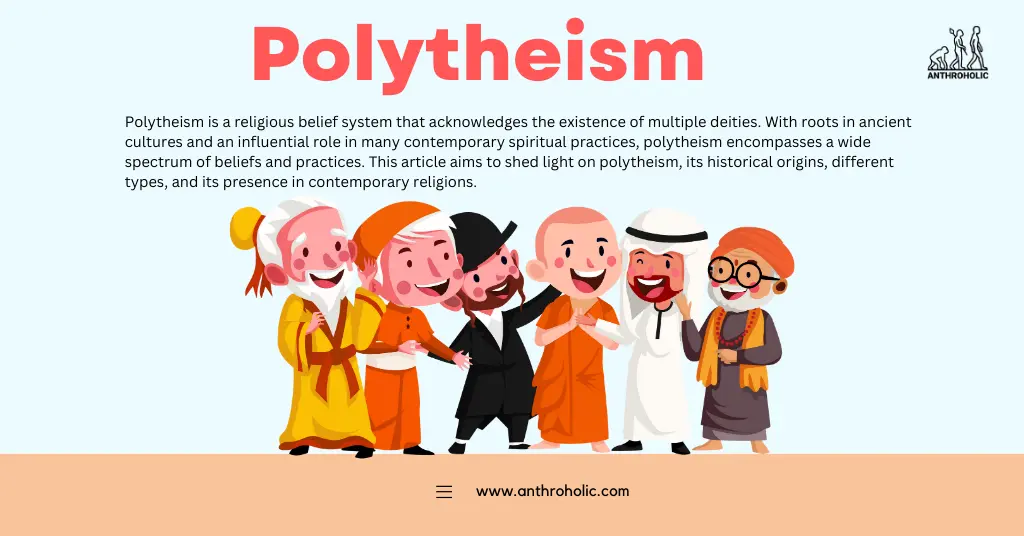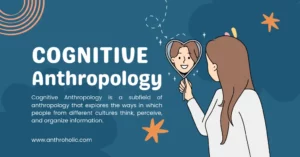AI Answer Evaluation Platform Live Now. Try Free Answer Evaluation Now
Polytheism
Polytheism is a religious belief system that acknowledges the existence of multiple deities. With roots in ancient cultures and an influential role in many contemporary spiritual practices, polytheism encompasses a wide spectrum of beliefs and practices [1].

Historical Background of Polytheism
Ancient Origins
Polytheism, from the Greek words ‘poly’ (many) and ‘theoi’ (gods), predates written history and has been a central component of human societies for millennia [2]. The concept is believed to have arisen in response to the diverse and complex natural phenomena that our ancestors sought to understand and influence.
Development and Spread
Over time, polytheistic religions developed, each characterized by a unique pantheon of gods and goddesses. From Ancient Egypt and Greece in the west to India and Japan in the east, polytheism became a widely practiced religious system.
Types of Polytheism
Polytheism can be divided into two broad categories:
- Hard Polytheism: This form of polytheism considers each god as a distinct individual with their personalities and areas of influence [3]. Examples include Ancient Greek and Norse religions.
- Soft Polytheism: In soft polytheism, gods are seen as different aspects of a single or a few deities. Hinduism is a prime example of this kind.
| Type | Description | Example |
|---|---|---|
| Hard Polytheism | Each deity is unique and distinct | Ancient Greek Religion |
| Soft Polytheism | Deities are viewed as different aspects of one or more divine principle | Hinduism |
Notable Polytheistic Religions
Ancient Egyptian Religion
The Ancient Egyptians worshipped a multitude of gods and goddesses, each representing various aspects of life and nature [4]. Major deities included Ra, the sun god, and Isis, the goddess of life and magic.
Ancient Greek Religion
The Ancient Greeks worshipped a pantheon of gods and goddesses, with twelve principal deities residing on Mount Olympus. These included Zeus, the king of the gods, and Athena, the goddess of wisdom [5].
Hinduism
Hinduism, one of the world’s oldest religions, recognizes multiple gods and goddesses, each representing different aspects of Brahman, the ultimate reality [6].
Polytheism in Contemporary Religions
Even in contemporary times, polytheism continues to influence various religions and spiritual practices. Many indigenous traditions around the world, such as the belief systems of Native Americans and Australian Aboriginals, continue to embrace a polytheistic worldview [7].
Similarly, contemporary pagan practices, like Wicca and Druidism, also recognize multiple deities. Moreover, many practitioners of these religions interpret their deities as symbolic archetypes rather than literal beings [8].
Impact of Polytheism on Society and Culture
Polytheism has made substantial contributions to human society and culture, influencing everything from art and literature to philosophy and law.
Art and Literature
Polytheistic religions have shaped human artistic expression in profound ways. From the intricate sculptures of Hindu gods in India to the epic poems of ancient Greece featuring their pantheon, polytheism has spurred human creativity, resulting in some of the world’s most awe-inspiring artworks and literary masterpieces [9].
Philosophy and Law
Many philosophical and legal principles trace their roots back to polytheistic societies. Ancient Greek philosophers, for instance, often derived their arguments and teachings from the mythology and religious practices of their polytheistic society [10].
Criticisms and Controversies of Polytheism
While polytheism has played an important role in human religious and cultural history, it has also been subject to criticism and controversy.
Viewed as Primitive
In the monotheistic religions of Judaism, Christianity, and Islam, polytheism is often viewed as a primitive or less developed form of spirituality [11].
Conflict with Science
Some critics argue that polytheism’s emphasis on multiple divine entities controlling different aspects of nature can conflict with scientific explanations of the natural world [12].
The Future of Polytheism
Despite criticisms, polytheism is experiencing a resurgence in many parts of the world, particularly within neo-pagan communities. As people search for spiritual paths that connect them more closely with nature and the feminine divine, polytheism offers a broad and diverse range of deities and mythologies to explore [13].
Conclusion
Polytheism, a belief in many gods, has been a fundamental part of human spiritual understanding for thousands of years. From ancient times to the present, polytheistic religions have provided a rich tapestry of mythology, wisdom, and understanding of the world around us.
While some may see polytheism as an ancient or primitive form of belief, it continues to provide a meaningful spiritual framework for many people worldwide. Its enduring presence underscores the diverse and multifaceted nature of human spirituality.
References
[1] Nongbri, B. (2013). Before Religion: A History of a Modern Concept. Yale University Press.
[2] Burkert, W. (1985). Greek Religion. Harvard University Press.
[3] Littleton, C. S. (2005). Gods, Goddesses, and Mythology. Marshall Cavendish.
[4] Wilkinson, R. H. (2003). The Complete Gods and Goddesses of Ancient Egypt. Thames & Hudson.
[5] Kershaw, S. P. (2010). The One Hundred Best of Greek Mythology. Oxford University Press.
[6] Flood, G. (1996). An Introduction to Hinduism. Cambridge University Press.
[7] Hultkrantz, A. (2006). The Religions of the American Indians. University of California Press.
[8] Adler, M. (2006). Drawing Down the Moon: Witches, Druids, Goddess-Worshippers, and Other Pagans in America. Penguin Books.
[9] Osborne, R. (2004). Art in the Ancient World: A Handbook of Styles and Forms. Thames & Hudson.
[10] Zeller, E. (2009). Outlines of the History of Greek Philosophy. Routledge.
[11] Armstrong, K. (1993). A History of God: The 4,000-Year Quest of Judaism, Christianity and Islam. Ballantine Books.
[12] Stenger, V. J. (2007). God: The Failed Hypothesis. How Science Shows That God Does Not Exist. Prometheus Books.
[13] Harvey, G. (2011). The Handbook of Contemporary Animism. Acumen.




